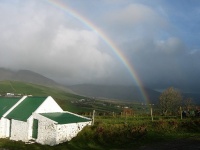Visit worldtravels.com for the full guide to Ireland. Build a complete Ireland travel guide and email to your clients - sign up for a trial subscription of World Travels Pro.
Ireland

The lure of Ireland lies in its landscapes and its people, and it is through involvement with both that visitors get to experience the soul of this ancient land of saints and scholars.
Ireland's hills are a walker's paradise, not only because of the extensive network of trails, but because by being on foot one gets to appreciate the lakes and rivers, the coastal views and ever-changing sky-scapes that are so much part of the Irish landscape. Watersports such as angling, sailing and surfing are popular too, and many visitors come for the golf, but the real passion of the Irish is horses - there is a potential Derby winner in every valley and a packed betting shop in every high street.
The Irish weather is not the most predictable in the world, but then much of the beauty of the Irish landscape is due to its climate and there has to be a price tag on being nicknamed the 'Emerald Isle'. Poor weather has had positive influences on the Irish way of life. Music and song plays an integral part in daily life and visitors are able to experience this in the many pubs so characteristic of the social landscape of Ireland.
Over the years, Ireland has survived invasions, famine and civil war, but has recently come into its own, benefiting from peace in the North, support from the EU and a new vitality which has caused the country to be dubbed the 'Celtic Tiger'. There has never been a better time to visit.
Climate
Ireland has a temperate climate and is cold and damp much of the year. Summer (May to September) is the warmest and driest season and is the best time to visit, though attractions can get crowded in July and August. Winter is characterised by short, wet, foggy days and long night, but the temperature rarely gets below freezing due to the tempering Gulf Stream winds that buffet the west coast of Ireland. Some attractions are only open in summer.
Money
The unit of currency is the Euro (EUR). Currency can be exchanged at banks and bureaux de change and ATMs are widely available. Credit and debit cards, as well as travellers cheques, are widely accepted.
Passport Visa
All foreign passengers to Ireland must be able to show proof of sufficient funds to cover their stay in the county. Additionally, passengers should hold return/onward tickets, and the necessary travel documentation for their next destination, as immigration officers might demand that they demonstrate proof of their intention to leave Ireland. If the traveller's passport bears a British inadmissable stamp, unless the immigration officer is convinced that they will NOT travel on to the United Kingdom, entry may be refused to Ireland. Note that all visitors need to contact the Garda National Immigration Bureau (GNIB), if their stay in Ireland exceeds their visa-free period, or their stay is longer than the period for which their visa is valid. NOTE: It is highly recommended that your passport has at least six months validity remaining after your intended date of departure from your travel destination. Immigration officials often apply different rules to those stated by travel agents and official sources.
Entry Requirements
- US citizens must have a passport that is valid for the period of intended stay in Ireland. No visa is required.
- British citizens must have a passport that is valid upon their arrival in Ireland. Passport exemptions apply to holders of proof of nationality issued to nationals of Ireland and British subjects, for travel between Ireland and Great Britain and Northern Ireland only. No visa is required for holders of British passports endorsed British Citizen, British National (Overseas) or British Overseas Territories Citizen.
- Canadian citizens must have a passport that is valid for the period of intended stay in Ireland. No visa is required.
- Australian citizens must have a passport that is valid for the period of intended stay in Ireland. No visa is required.
- South African citizens must have a passport that is valid for the period of intended stay in Ireland. No visa is required.
- New Zealand citizens must have a passport that is valid for the period of intended stay in Ireland. No visa is required.
Health
There are no special health requirements for visitors to Ireland. Health insurance is advisable unless from the UK or other EU countries, most of which have reciprocal agreements with Ireland. A European Health Insurance Card (EHIC) should be obtained before departing for travel to Ireland. Medical facilities are good, and payment for treatment is usually required in cash.
Embassy Consulates
- Irish Embassy, Washington DC, United States: +1 202 462 3939.
- Irish Embassy, London, United Kingdom: +44 (0)20 7235 2171.
- Irish Embassy, Ottawa, Canada: +1 613 233 6281.
- Irish Embassy, Canberra, Australia: +61 (0)2 6214 0000.
- Irish Embassy, Pretoria, South Africa: +27 (0)12 342 5062.
- Consulate-General of Ireland, Auckland, New Zealand: +64 (0)9 977 2252.
Foreign Embassies
- United States Embassy, Dublin: +353 (0)1 630 6200.
- British Embassy, Dublin: +353 (0)1 205 3700.
- Canadian Embassy, Dublin: +353 (0)1 234 4000.
- Australian Embassy, Dublin: +353 (0)1 664 5300.
- South African Embassy, Dublin: +353 (0)1 661 5553.
- New Zealand High Commission, London, United Kingdom (also responsible for Ireland): +44 (0)20 7930 8422.







